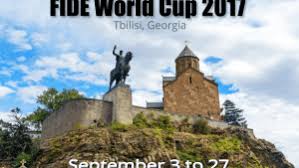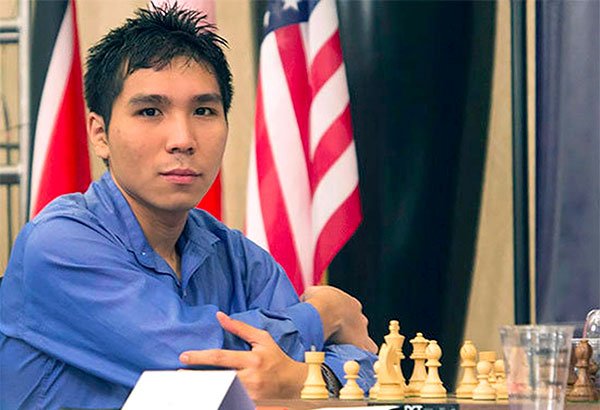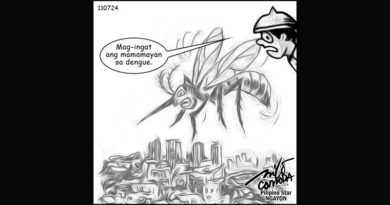FIDE World Cup 2017 | Wesley So (USA) finally defeats Jobava, enters quarterfinals in World Chess Cup



Wesley: So far, so good
.
LET’S PLAY CHESS By Edgar De Castro (The Philippine Star) |
Updated September 17, 2017 – 12:00am
The quarterfinals of the World Chess Cup in Tbilisi, will be in its final stages, as we go to press. Armenian star Levon Aronian, seeded fifth, registered the only win of the day, trouncing 29th seed Vassily Ivanchuk of Ukraine in just 24 moves of a Catalan Opening, while other matches – No. 26 Vladimir Fedoseev (Russia) vs No. 2 Wesley So (USA), No. 16 Peter Svidler (Russia) against No. 8 Maxime Vachier – Lagrave (France) and No. 51 Richard Rapport (Hungary) vs 11th seed Ding Liren (China), all ended in draws.
Meanwhile, players and fans have been divided on whether there’s an opening for new faces to challenge the established elite. With seven of the top 10 seeds (No. 1 Carlsen, No. 3 Caruana, No. 4 Kramnik, No. 6 Mamedyarov, No. 7 Nakamura, No. 9 Grischuk and No. 10 Anand), gone, there’s hope. Led by 21-year-old Rapport, Fedoseev, 22, Liren 25 and a host of others, these young 20 something generation of challengers has injected a dose of excitement at the ongoing World Cup.
So’s fourth win in Tbilisi is a brilliant refutation of White’s faulty handling of the opening. He caps his performance with a beautiful exchange sacrifice on the 24th move.
.
FIDE World Cup 2017
W) F. Vallejo Pons (Spain)
B) W. So (USA)
Caro-Kann Defense
1. e4 c6
The Caro-Kann was first introduced into tournament play in 1885 by Austrian master Marcus Kann, who pioneered and studied the defense with British master Horatio Caro. Nowadays the Caro-Kann is one of Black’s important systems of defense against 1. e2-e4 opening.
2. d4 d5
3. e5 …
This, the Advanced Variation, leads to more complicated type of struggle, than other lines owing to its aggressive outlook and attacking possibilities.
3… Bf5
4. g4 …
Of the alternatives, 4. Nc3, known as the Bayonet Attack, is more popular. The game leads to equality after 4…e6 5. g4 Bg6 6. Nge2 c5 7. h4 h6 8. Be3 Qb6 9. Qd2 Nc6 10. 0-0-0 h5; 4. Bd3 Bxd3 5. Qxd3 e6 6. Nc3 Qb6 7. Nge2 Qa6 is equal as well; 4. h4 h5 5. c4 is unclear.
4… Be4
After 4…Bd7 5. c4 e6 6. Nc3 c5!? the game hangs in the balance.
5. f3 Bg6
6. h4 h5
7. e6? …
The start of White’s trouble. Safer is 7. Ne2 and after 7…hxg4 8. hxg4 e6 the game is probably even, according to the engine. The text exposes White’s Kingside to Black’s pieces.
7… Qd6!
Exploiting his opponent’s weak Kingside.
8. exf7ch Bxf7
9. Be3 …
After 9. Qe2 hxg4 10. fxg4 Nf6, Black has a clear advantage.=computer.
9… hxg4
10. fxg4 Nf6
11. Nc3 Qe6
12. Kd2? …
In a difficult position, a slip comes easily, and this one is fatal. After 12. Qe2 Nxg4 13. Bg5 Nd7, White is a pawn down, but the game continues.=Engine.
12… Nxg4
13. Bg5? …
Desperation. 13. Rh3 is necessary.
13… Nf2
14. Qf3 Nxh1
White loses the exchange without compensation.
15. Qxh1 Qd6
16. Bh3 e6
17. Rf1 Be7
18. Bf4 Qb4
19. Ne2 Nd7
Now White is almost out of playable moves.
20. a3 Qxb2
21. Rb1 Qxa3
22. Rxb7 Qa6
23. Qb1 Rxh4
24. Bf1 Rxf4!
Resignation is honorable at this point, as after the text, White faces too much danger for his poorly protected King.
25. Nxf4 Qa5
26. Qe1 Bg5
27. Qg3 Bh6
28. Bd3 O-O-O!
Note the logic in Black’s move. Not a single tempo is wasted.
29. Rb3 e5
30. dxe5 d4 0-1
<>
Solution to last week’s puzzle:
Black to move and win.
white=Kh4, Qf7, Pf4, Pg3, Ph3
black=Kh7, Qe4, Pe2, Pf5, Pg7, Ph6
1… Qxf4ch!
1…e1=Q??
2. Qg6ch! and draws since
2…Kxg6 is stalemate, while 2…Kg8 3. Qe8ch Kh7 4. Qg6ch leads to perpetual check.
2. gxf4 …
2. Kh5 Qg5 mate.
2… e1=Qch
3. Kh5 Qe2ch
4. Kh4 Qf2ch
5. Kh5 Qf3ch
6. Kh4 Qxf4ch
7. Kh5 Qg5 mate.











